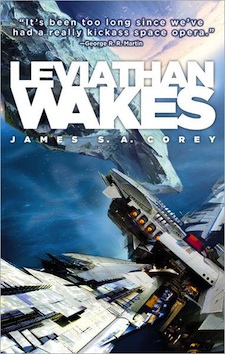“James S.A. Corey” is a barely hidden at all pen-name for Daniel Abraham and Ty Franck, and knowing the Abraham connection is why I picked this book up last summer. I wasn’t disappointed. Abraham is a writer who knows what he’s doing, and it seems collaboration works just as well for him as writing alone. I met Daniel in Reno and he told me that this book was largely written on Wednesdays, at which I am just in awe.
Leviathan Wakes is in many ways a very conventional, indeed traditional, SF novel. It’s set in the near future solar system when humanity is politically divided into Earth and Mars and Belt, when huge corporations are out to make a profit, and little ships are just scraping by hauling gas or ice. There’s a fast moving investigation and chase, there’s a slowly developing alien mystery, there are wars, there’s science, there’s romance, space battles, close up battles—everything you could want. The unusual thing is that there really haven’t been many books shaken up out of these ingredients in recent decades. I kept thinking that this was the best seventies SF novel I’d read in simply ages. Yet this is the solar system of today, the solar system our recent robot explorers have revealed to us, so much more interesting than we used to think it was. And like the SF that inspired it, Leviathan Wakes is a fast-moving adventure story that makes you think about all sorts of issues in all kinds of spheres. It reminds me of Niven and Heinlein—but there’s also a grittiness here that recalls Cherryh.
Holden is the executive officer of a long haul ship. He’s Earth-born and had a stint in the navy. He’s wildly idealistic and believes that information ought to be free, even if it’s the dangerous sort of information. Miller is a Belter cop on Ceres, getting older, divorced, and with his head going deeper into the bottle all the time. They aren’t the two people you’d pick to uncover a solar-system wide mystery with vast ramifications, but they’re the protagonists we have, caught up in events and carrying us along with them. They’re great characters. Holden calls his ship Rocinante after Don Quixote’s horse, and Miller figures it out.
This is a remarkably atmospheric book. From the first page we’re deeply immersed in these spaceships and habitats. They feel like real places—they have layers. (Reno, which I saw for the first time a few days after first reading this, reminded me of the asteroid Eros.) This is a future with classes and politics and revolutions but where that isn’t the focus of the story, that’s just part of the worldbuilding. The whole solar system, physical, political, social, is sketched in and then parts of it are filled out. It’s a lovely example of the universe and the plot being inherent in the characters and their situations—this is a fast read, a book that doesn’t stop to tell you things lets you absorb them as you’re carried along past them. It’s a long book but not a long read—I read it both times in one day, where you’d think from the physical heft of the thing that it would have taken longer.
Leviathan Wakes has satisfying volume completion—which is something I have come to expect from Abraham. It does leave things wide open for sequels, and indeed this is the first of a trilogy, with the sequel Caliban’s War due out this year.
If you like science fiction with great characters and set in real space, you’ll enjoy this one.
Jo Walton is a science fiction and fantasy writer. She’s published two poetry collections and nine novels, most recently Among Others, and if you liked this post you will like it. She reads a lot, and blogs about it here regularly. She comes from Wales but lives in Montreal where the food and books are more varied.










